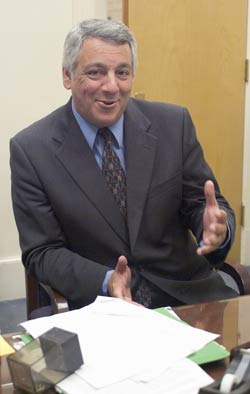The Man Who Wouldn’t be VP
Richard Campagna was at a ballgame in Cleveland one night this past spring when he was asked to appear on a radio show with an evangelical Christian pastor.
As the Libertarian candidate for Vice-President of the United States, the 52-year-old Campagna (TC M.A., '91), has learned to take his media opportunities where he finds them, and he readily accepted. The only catch: out of respect for the pastor, the station wanted him to wear a tie.
"I drove from K-Mart to K-Mart and finally found a five-dollar tie that wasn't too bad. I got to the station and there was the pastor in a crumpled-up tee-shirt. We ate some doughnuts, and he squished jelly on my tie." Campagna laughed, shaking his head. A mild-mannered man with a self-deprecating sense of humor, he was telling an interviewer in New York this past September about his past two years on the road. "Still, I think the Christian community came away with a better understanding of Libertarianism." In his book about the 1988 presidential election, What It Takes, Richard Ben Cramer writes about the ambition, self-confidence and egotism that drive otherwise sane human beings to endure the rigors of the campaign trail. But what about a man whose going-in proposition is that he won't win?
"A mainstay of my campaign is that I do more counseling and psychotherapy for the American electorate than politics," said Campagna, a Brooklyn-born lawyer who decided in his late 30s to earn a degree in Counseling Psychology at TC-a place he describes as having a certain "existential optimism" that dove-tails with his own. "People want someone who'll listen like a neighbor or a friend. Someone who'll show them a lifestyle instead of political sound-bites. So I'm highly conversational. I steadfastly refuse to have a stump speech, and I don't have a prepackaged set of one-liners."
Still, certain ideas crop up regularly when he talks. Libertarianism is "a bottom-up form of government rather than top-down command and control." Libertarians are willing to be taxed for basic protections like the police force and the military, "but we very much buy the old adage about ‘that government which governs least.'" And the U.S. Constitution is "not just a good idea but the law."
"I'm not some right-wing wacko, but this country is in a crisis right now in which the Constitution is being applied in nearly every area of life in ways that go far beyond the Founders' intent," he said.
Take school reform. "It's of dubious constitutionality to see this huge federal department of education forcing its programs on states," said Campagna, whose distaste for big government was nurtured in childhood (his mother was a Democratic party boss and his father was a Deputy State Tax Collector). "Ditto Medicare, Medicaid and Social Security. These departments, with their command and control approach, are the most misguided and corrupt."
When last seen in New York, Campagna was predicting the Libertarians would garner a couple of million votes (they didn't, but still upped their previous high and nearly matched Ralph Nader) and that a richer, more famous candidate would better that in the future. This was probably his own last shot at national office, he said. Still, as he headed off for the vice-presidential debate in Cleveland (the smaller party candidates were having their own session), one sensed he views life on the campaign trail as an end in itself-Libertarianism in its purest form.
"I'll probably take a plane, but if I had more time, I'd drive," he mused. "I do that a lot. I like to be in control of my own destiny."
Published Friday, Nov. 12, 2004
